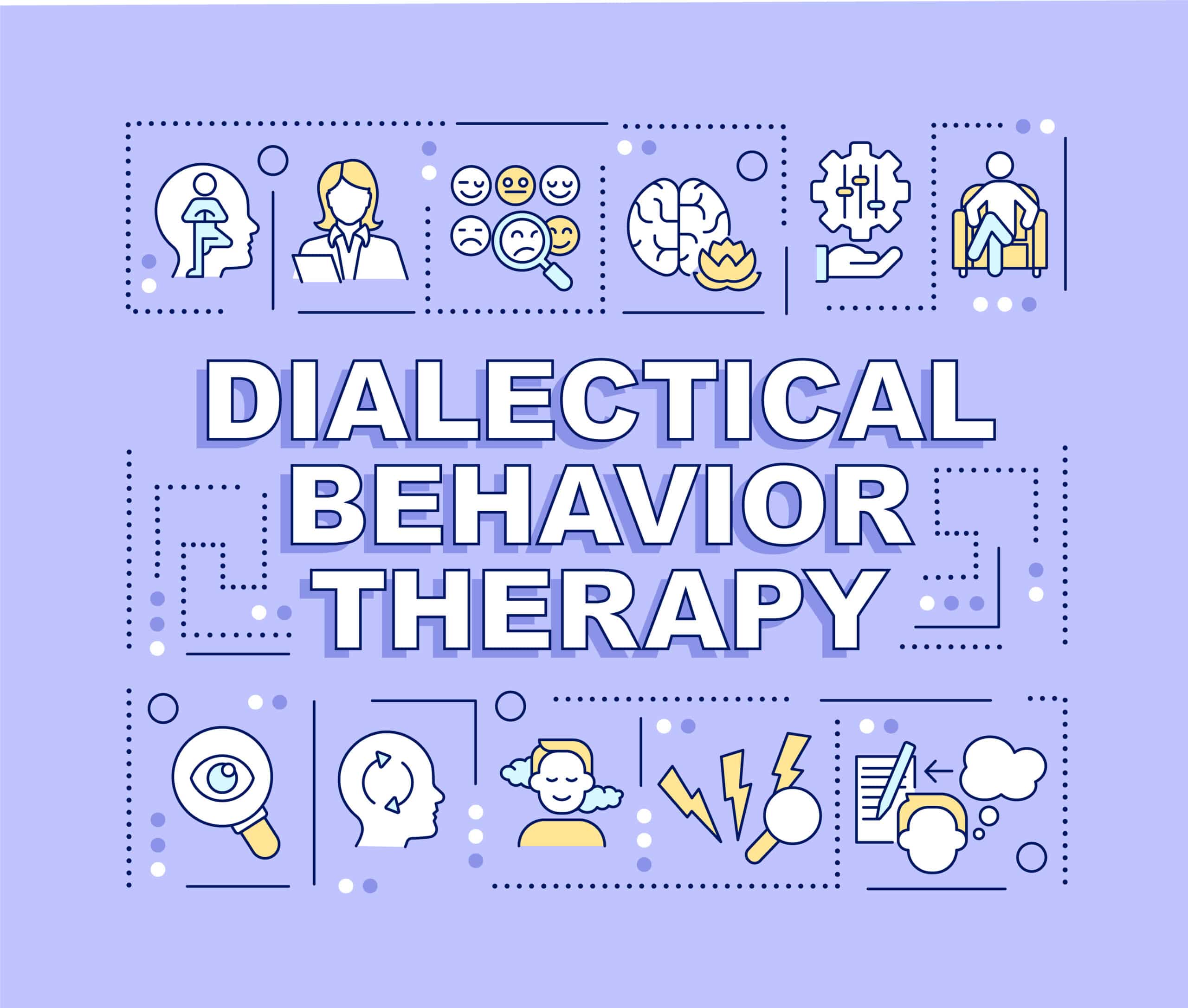Encouraging Individuals With Effective Dialectical Practices Treatment (DBT) Solutions: Building Stronger Mental Health Foundations
In the world of psychological health and wellness, the significance of equipping people via effective Dialectical Behaviour Therapy (DBT) services can not be overemphasized. By focusing on the core concepts of DBT, such as improving psychological guideline abilities, improving interpersonal performance, developing distress tolerance methods, and growing mindfulness practices, people can begin on a journey towards building more powerful mental wellness structures.
Recognizing the Core Concepts of DBT


One core concept of DBT is validation. Specialists using DBT recognize the client's sensations and habits as valid actions to their setting. This validation assists develop a strong healing alliance and encourages clients to function in the direction of change. One more basic facet is dialectics, which teaches people to check out circumstances from several viewpoints and locate the synthesis in between contradictory ideas or emotions.
Moreover, the principle of dialectical abstaining is main to DBT. This concept urges individuals to avoid suicidal actions while likewise approving themselves. By comprehending and integrating these core principles, specialists can efficiently implement DBT methods and assistance individuals in their trip in the direction of psychological guideline and mental well-being.
Enhancing Psychological Policy Skills
Creating effectiveness in taking care of feelings is a basic aspect of promoting psychological health and interpersonal performance - DBT London. Enhancing emotional regulation abilities is a core component of Dialectical Practices Treatment (DBT) that equips people with the tools to navigate extreme feelings in a constructive and healthy and balanced way. Through DBT, individuals discover to recognize, recognize, and control their emotions, bring about boosted psychological health and wellness outcomes
DBT stresses the importance of mindfulness, which involves being existing in the moment without judgment. This technique permits individuals to observe their feelings without becoming bewildered by them, enhancing their capacity to respond effectively instead of react impulsively. By growing mindfulness, people can establish a better feeling of self-awareness and psychological control.
In addition, DBT instructs useful skills such as distress tolerance and emotion regulation methods to assist people manage challenging emotions. By learning these skills, individuals can lower impulsive actions, boost decision-making, and reinforce their connections with others. Ultimately, improving emotional policy skills with DBT equips individuals to lead more fulfilling and balanced lives.

Improving Interpersonal Efficiency
Having actually established a solid foundation in psychological policy skills within the framework of Dialectical Behavior Treatment (DBT), the emphasis currently changes towards improving social efficiency. Improving interpersonal efficiency is a critical element of DBT as it equips individuals with the required abilities to browse social interactions, connect effectively, set limits, and develop much healthier partnerships.
In DBT, interpersonal here efficiency skills are taught with modules that focus on areas such as assertiveness, effective communication, and social problem-solving. By learning these skills, individuals can boost their ability to express their desires and requirements, preserve self-respect, and construct stronger connections with others.
Exercising mindfulness is an integral component of improving social effectiveness within the DBT structure. Mindfulness allows individuals to be existing in their interactions, pay attention actively, and respond attentively as opposed to react impulsively. By incorporating mindfulness right into their day-to-days live, get redirected here individuals can grow greater self-awareness and psychological law, which are crucial for successful social interactions.
Building Distress Resistance Strategies
Discovering effective methods for handling emotional distress is essential for individuals seeking to enhance their coping skills and strength. Building distress tolerance techniques is an essential facet of Dialectical Behaviour Therapy (DBT) that equips people to browse challenging emotions without coming to be overwhelmed - DBT London. One essential method in DBT for distress resistance is the phrase "ACCEPTS," which stands for Activities, Adding, Contrasts, Feelings, Pressing away, Thoughts, and Feelings. By using these methods, individuals can efficiently manage upsetting situations and manage their psychological feedbacks.
Additionally, mindfulness methods play a considerable role in structure distress tolerance. Mindfulness urges people to remain existing in the minute without judgment, enabling them to observe their thoughts and feelings without reacting impulsively. This understanding allows individuals to tolerate distress better and establish a greater feeling of control over their feedbacks.
In addition to these techniques, creating a tailored distress resistance strategy with the guidance of a trained therapist can offer individuals with a tailored technique to managing psychological distress - DBT London. By including these techniques into day-to-day live, individuals can enhance their psychological wellness foundations and improve their general well-being
.jpg)
Cultivating Mindfulness Practices
To strengthen their distress tolerance methods even more, individuals can focus on cultivating mindfulness techniques as a corresponding approach within the structure of Click Here Dialectical Behavior Therapy (DBT) Mindfulness, a crucial component of DBT, includes focusing on today minute without judgment. By promoting mindfulness, individuals can boost their recognition of thoughts, feelings, and physical feelings, promoting a deeper understanding of themselves and their experiences.
Mindfulness techniques in DBT include methods such as mindful breathing, body scans, and observing ideas without add-on. These techniques urge individuals to create a non-reactive position towards their internal experiences, permitting them to react to challenging situations with higher clarity and composure. By incorporating mindfulness into day-to-day regimens, people can learn to regulate their feelings better, lower spontaneous habits, and grow a feeling of inner tranquility.
Through cultivating mindfulness practices, people undergoing DBT can develop a solid structure for handling stress, enhancing relationships, and improving overall well-being. By integrating mindfulness into their healing journey, individuals can create important abilities that empower them to navigate life's difficulties with resilience and self-awareness.
Final Thought
In conclusion, effective Dialectical Behavior Treatment (DBT) solutions play a critical role in encouraging people to build more powerful mental health structures. By recognizing the core concepts of DBT, enhancing psychological guideline skills, improving interpersonal efficiency, developing distress tolerance techniques, and cultivating mindfulness practices, people are geared up with the needed tools to browse their emotions, relationships, and obstacles in a much more durable and flexible way. DBT services provide an extensive approach to promoting psychological well-being and equipping individuals to lead fulfilling lives.
By concentrating on the core concepts of DBT, such as enhancing psychological policy skills, enhancing interpersonal performance, developing distress resistance strategies, and cultivating mindfulness techniques, people can begin on a journey towards structure stronger psychological health structures. Enhancing psychological policy abilities is a core part of Dialectical Practices Therapy (DBT) that gears up people with the devices to browse intense emotions in a constructive and healthy and balanced manner.Moreover, DBT educates practical skills such as distress tolerance and emotion guideline strategies to help individuals manage challenging emotions.To deepen their distress tolerance methods additionally, people can concentrate on growing mindfulness methods as a corresponding technique within the structure of Dialectical Behaviour Therapy (DBT) By comprehending the core principles of DBT, improving emotional policy skills, improving social performance, constructing distress resistance methods, and cultivating mindfulness methods, individuals are geared up with the required devices to navigate their feelings, partnerships, and challenges in a much more flexible and resilient manner.
Comments on “Transforming Lives: DBT London's Holistic Strategy to Recovery”